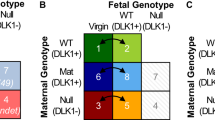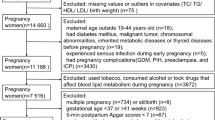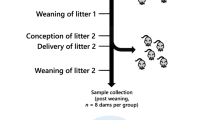Abstract
Intrauterine malnutrition is associated with increased susceptibility to chronic diseases in adulthood. Growth-restricted infants display a less favorable lipid profile already shortly postnatal. Maternal low protein diet (LPD) during gestation is a well-defined model of fetal programming in rodents and affects lipid metabolism of the offspring. Effects of LPD throughout gestation on physiologic relevant parameters of lipid metabolism are unclear. We aimed to determine effects of LPD on maternal-fetal cholesterol fluxes and fetal lipid synthesis in mice. Pregnant mice (dams) were fed with a control (18% casein) or an LPD (9% casein) from E0.5 onward. We quantified maternal-fetal cholesterol transport and maternal cholesterol absorption at E19.5 using stable isotopes. We determined fetal lipid biosynthesis at E19.5, after administration of (1-13C)-acetate from E17.5 onward. LPD did not change fetal and maternal plasma and hepatic concentrations of cholesterol and triglycerides. LPD affected neither the magnitudes of maternal-fetal cholesterol flux, maternal cholesterol absorption, nor fetal synthesis of cholesterol and palmitate (both groups, ∼14% and ∼13%, respectively). We conclude that LPD throughout gestation in mice does not affect maternal-fetal cholesterol transport, fetal cholesterol or fatty acid synthesis, indicating that programming effects of LPD are not mediated by short-term changes in maternal-fetal lipid metabolism.
Similar content being viewed by others
Log in or create a free account to read this content
Gain free access to this article, as well as selected content from this journal and more on nature.com
or
Abbreviations
- E:
-
embryonic day
- MIDA:
-
mass isotopomer distribution analysis
References
Osmond C, Barker DJ 2000 Fetal, infant, and childhood growth are predictors of coronary heart disease, diabetes, and hypertension in adult men and women. Environ Health Perspect 108: 545–553
Barker DJ, Martyn CN, Osmond C, Hales CN, Fall CH 1993 Growth in utero and serum cholesterol concentrations in adult life. BMJ 307: 1524–1527
Fall CH, Osmond C, Barker DJ, Clark PM, Hales CN, Stirling Y, Meade TW 1995 Fetal and infant growth and cardiovascular risk factors in women. BMJ 310: 428–432
Kajantie E, Barker DJ, Osmond C, Forsen T, Eriksson JG 2008 Growth before 2 years of age and serum lipids 60 years later: the Helsinki Birth Cohort study. Int J Epidemiol 37: 280–289
Wang X, Cui Y, Tong X, Ye H, Li S 2007 Glucose and lipid metabolism in small-for-gestational-age infants at 72 hours of age. J Clin Endocrinol Metab 92: 681–684
Herman GE 2003 Disorders of cholesterol biosynthesis: prototypic metabolic malformation syndromes. Hum Mol Genet 12: R75–R88
Belknap WM, Dietschy JM 1988 Sterol synthesis and low density lipoprotein clearance in vivo in the pregnant rat, placenta, and fetus. Sources for tissue cholesterol during fetal development. J Clin Invest 82: 2077–2085
Woollett LA 1996 Origin of cholesterol in the fetal golden Syrian hamster: contribution of de novo sterol synthesis and maternal-derived lipoprotein cholesterol. J Lipid Res 37: 1246–1257
Haave NC, Innis SM 2001 Cholesterol synthesis and accretion within various tissues of the fetal and neonatal rat. Metabolism 50: 12–18
Yoshida S, Wada Y 2005 Transfer of maternal cholesterol to embryo and fetus in pregnant mice. J Lipid Res 46: 2168–2174
Burke KT, Colvin PL, Myatt L, Graf GA, Schroeder F, Woollett LA 2009 Transport of maternal cholesterol to the fetus is affected by maternal plasma cholesterol concentrations in the golden Syrian hamster. J Lipid Res 50: 1146–1155
Napoli C, D'Armiento FP, Mancini FP, Postiglione A, Witztum JL, Palumbo G, Palinski W 1997 Fatty streak formation occurs in human fetal aortas and is greatly enhanced by maternal hypercholesterolemia. Intimal accumulation of low density lipoprotein and its oxidation precede monocyte recruitment into early atherosclerotic lesions. J Clin Invest 100: 2680–2690
Napoli C, Witztum JL, Calara F, de Nigris F, Palinski W 2000 Maternal hypercholesterolemia enhances atherogenesis in normocholesterolemic rabbits, which is inhibited by antioxidant or lipid-lowering intervention during pregnancy: an experimental model of atherogenic mechanisms in human fetuses. Circ Res 87: 946–952
Roseboom TJ, van der Meulen JH, Ravelli AC, Osmond C, Barker DJ, Bleker OP 2001 Effects of prenatal exposure to the Dutch famine on adult disease in later life: an overview. Mol Cell Endocrinol 185: 93–98
Armitage JA, Khan IY, Taylor PD, Nathanielsz PW, Poston L 2004 Developmental programming of the metabolic syndrome by maternal nutritional imbalance: how strong is the evidence from experimental models in mammals?. J Physiol 561: 355–377
Langley-Evans SC, Phillips GJ, Jackson AA 1994 In utero exposure to maternal low protein diets induces hypertension in weanling rats, independently of maternal blood pressure changes. Clin Nutr 13: 319–324
Erhuma A, Salter AM, Sculley DV, Langley-Evans SC, Bennett AJ 2007 Prenatal exposure to a low-protein diet programs disordered regulation of lipid metabolism in the aging rat. Am J Physiol Endocrinol Metab 292: E1702–E1714
Lucas A, Baker BA, Desai M, Hales CN 1996 Nutrition in pregnant or lactating rats programs lipid metabolism in the offspring. Br J Nutr 76: 605–612
Roghair RD, Segar JL, Kilpatrick RA, Segar EM, Scholz TD, Lamb FS 2007 Murine aortic reactivity is programmed equally by maternal low protein diet or late gestation dexamethasone. J Matern Fetal Neonatal Med 20: 833–841
Goyal R, Galffy A, Field SA, Gheorghe CP, Mittal A, Longo LD 2009 Maternal protein deprivation: changes in systemic renin-angiotensin system of the mouse fetus. Reprod Sci 16: 894–904
van Straten EM, Bloks VW, Huijkman NC, Baller JF, Meer H, Lutjohann D, Kuipers F, Plosch T 2010 The liver X-receptor gene promoter is hypermethylated in a mouse model of prenatal protein restriction. Am J Physiol Regul Integr Comp Physiol 298: R275–R282
Langley-Evans SC, Gardner DS, Jackson AA 1996 Association of disproportionate growth of fetal rats in late gestation with raised systolic blood pressure in later life. J Reprod Fertil 106: 307–312
van Straten EM, Huijkman NC, Baller JF, Kuipers F, Plosch T 2008 Pharmacological activation of LXR in utero directly influences ABC transporter expression and function in mice but does not affect adult cholesterol metabolism. Am J Physiol Endocrinol Metab 295: E1341–E1348
Kunieda T, Xian M, Kobayashi E, Imamichi T, Moriwaki K, Toyoda Y 1992 Sexing of mouse preimplantation embryos by detection of Y chromosome-specific sequences using polymerase chain reaction. Biol Reprod 46: 692–697
Neese RA, Faix D, Kletke C, Wu K, Wang AC, Shackleton CH, Hellerstein MK 1993 Measurement of endogenous synthesis of plasma cholesterol in rats and humans using MIDA. Am J Physiol 264: E136–E147
Bligh EG, Dyer WJ 1959 A rapid method of total lipid extraction and purification. Can J Biochem Physiol 37: 911–917
van der Veen JN, van Dijk TH, Vrins CL, van Meer H, Havinga R, Bijsterveld K, Tietge UJ, Groen AK, Kuipers F 2009 Activation of the liver X receptor stimulates trans-intestinal excretion of plasma cholesterol. J Biol Chem 284: 19211–19219
Oosterveer MH, van Dijk TH, Tietge UJ, Boer T, Havinga R, Stellaard F, Groen AK, Kuipers F, Reijngoud DJ 2009 High fat feeding induces hepatic fatty acid elongation in mice. PLoS One 4: e6066
Turley SD, Herndon MW, Dietschy JM 1994 Reevaluation and application of the dual-isotope plasma ratio method for the measurement of intestinal cholesterol absorption in the hamster. J Lipid Res 35: 328–339
Hellerstein MK, Neese RA 1992 Mass isotopomer distribution analysis: a technique for measuring biosynthesis and turnover of polymers. Am J Physiol 263: E988–E1001
Lee WN, Byerley LO, Bergner EA, Edmond J 1991 Mass isotopomer analysis: theoretical and practical considerations. Biol Mass Spectrom 20: 451–458
Festing MF 2006 Design and statistical methods in studies using animal models of development. ILAR J 47: 5–14
Langley-Evans SC, Welham SJ, Jackson AA 1999 Fetal exposure to a maternal low protein diet impairs nephrogenesis and promotes hypertension in the rat. Life Sci 64: 965–974
Bhasin KK, van Nas A, Martin LJ, Davis RC, Devaskar SU, Lusis AJ 2009 Maternal low-protein diet or hypercholesterolemia reduces circulating essential amino acids and leads to intrauterine growth restriction. Diabetes 58: 559–566
Bol VV, Delattre AI, Reusens B, Raes M, Remacle C 2009 Forced catch-up growth after fetal protein restriction alters the adipose tissue gene expression program leading to obesity in adult mice. Am J Physiol Regul Integr Comp Physiol 297: R291–R299
Yates Z, Tarling EJ, Langley-Evans SC, Salter AM 2009 Maternal undernutrition programmes atherosclerosis in the ApoE*3-Leiden mouse. Br J Nutr 101: 1185–1194
Langley SC, Browne RF, Jackson AA 1994 Altered glucose tolerance in rats exposed to maternal low protein diets in utero. Comp Biochem Physiol Physiol 109: 223–229
Langley-Evans SC, Gardner DS, Jackson AA 1996 Maternal protein restriction influences the programming of the rat hypothalamic-pituitary-adrenal axis. J Nutr 126: 1578–1585
Author information
Authors and Affiliations
Corresponding author
Additional information
Supported by grant 2004T048 from a Dr. Dekker fellowship of the Dutch Heart Foundation (T.P.).
Rights and permissions
About this article
Cite this article
van Meer, H., van Straten, E., Baller, J. et al. The Effects of Intrauterine Malnutrition on Maternal-Fetal Cholesterol Transport and Fetal Lipid Synthesis in Mice. Pediatr Res 68, 10–15 (2010). https://doi.org/10.1203/PDR.0b013e3181e1219b
Received:
Accepted:
Issue date:
DOI: https://doi.org/10.1203/PDR.0b013e3181e1219b



